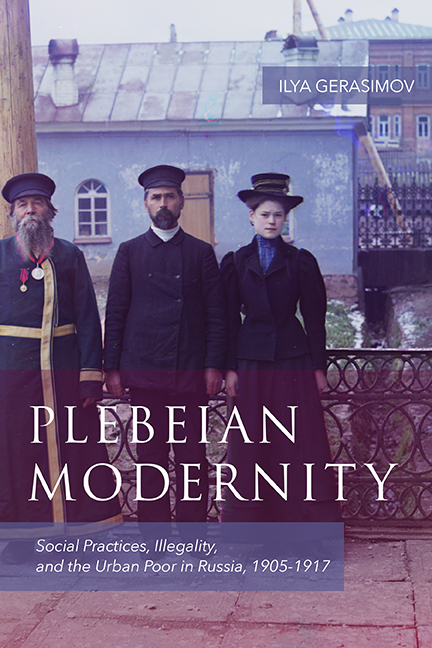Book contents
- Frontmatter
- Contents
- Acknowledgments
- Note on Editorial Conventions
- Introduction: The Subalterns Speak Out: Gerasim and the Infamous
- 1 Writing Degree Zero, and Beyond: Reading Social Practices between the Lines
- 2 The Middle Volga City as the Middle Ground: Urban Plebeian Society
- 3 The Patriarchal Metropolis: Trespassing Social Barriers in Late Imperial Vilna
- 4 “We Only Kill Each Other”: The Anthropology of Deadly Violence and Contested Intergroup Boundaries
- 5 The Transformative Social Experience of Illegality
- Epilogue: Gerasim in Power: A Plebeian Modernity
- Notes
- Selected Bibliography
- Index
1 - Writing Degree Zero, and Beyond: Reading Social Practices between the Lines
Published online by Cambridge University Press: 09 June 2021
- Frontmatter
- Contents
- Acknowledgments
- Note on Editorial Conventions
- Introduction: The Subalterns Speak Out: Gerasim and the Infamous
- 1 Writing Degree Zero, and Beyond: Reading Social Practices between the Lines
- 2 The Middle Volga City as the Middle Ground: Urban Plebeian Society
- 3 The Patriarchal Metropolis: Trespassing Social Barriers in Late Imperial Vilna
- 4 “We Only Kill Each Other”: The Anthropology of Deadly Violence and Contested Intergroup Boundaries
- 5 The Transformative Social Experience of Illegality
- Epilogue: Gerasim in Power: A Plebeian Modernity
- Notes
- Selected Bibliography
- Index
Summary
Now here is an example of a mode of writing whose function is no longer only communication or expression, but the imposition of something beyond language, which is both History and the stand we take in it.
—Roland Barthes, Writing Degree Zero (1953)A Late Imperial City as a Foreign Country
“The past is a foreign country: they do things differently there,” warned L. P. Hartley back in 1953. This was a radical response to the philosophical musing by Marcel Proust sometime around 1923: “The only true voyage … would be not to visit strange lands but to possess other eyes.” In Hartley's formula, taking a fresh look (with “other eyes”) at a seemingly familiar object or situation means automatically turning them into artifacts of “strange lands.” This operation— which Viktor Shklovsky called “estrangement” (ostranenie) in 1917—is required to differentiate our habits of thought from an object's deeper meaning.Making the object look strange, unfamiliar, or unpredictable is necessary to study it as a phenomenon in its own right, endowed with a rationale of its own. An act of epistemological emancipation is a necessary prerequisite for free thinking about diversity, as well as for any further steps toward political and social liberation.
Overshadowed for much of the twentieth century by the dominant historical narrative centered on the 1917 Revolution as the culmination of Russia's prior development, studies of the late imperial period became a booming field only in the 1990s. Probably because of the need to legitimize this new interest in the period and in topics not limited to the revolutionary movement, the dominant mode of history writing on the Russian early twentieth century has been one of “familiarization.” The most innovative studies were discovering a bourgeois modernity, middle-class sensibilities, and mass culture in Russia very similar to those familiar from European and American history. Recognizable elements of “global modernity” helped to identify methodological approaches to studying Russian realities and incorporating them into ready historical narratives, even if through a certain revisionism.
- Type
- Chapter
- Information
- Plebeian ModernitySocial Practices, Illegality, and the Urban Poor in Russia, 1906–1916, pp. 18 - 54Publisher: Boydell & BrewerPrint publication year: 2018



